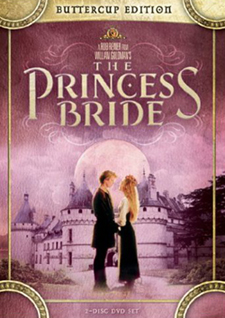|
Reviews of Recent Independent, Foreign, & Documentary Films in Theaters and DVD/Home Video
Directed by: Rob Reiner. Produced by: Andrew Scheinman & Rob Reiner. Written by: William Goldman, based upon his book. Director of Photography: Adrian Biddle. Edited by: Robert Leighton. Music by: Mark Knopfler. Released by: MGM/Sony. Country of Origin: USA. 98 min. Rated PG. With: Cary Elwes, Mandy Patinkin, Chris Sarandon, Christopher Guest, Wallace Shawn, André the Giant, Robin Wright, Peter Falk, Carol Kane & Billy Crystal. DVD Features: 2-Disc Set; Limited Edition with choice of Dread Pirate or Buttercup packaging. Disc 1: Feature film. Commentary by director Reiner. Audio commentary by writer Goldman. English/French/Spanish audio. Optional English/French/Spanish subtitles. Photo gallery. Disc 2: “As You Wish: The Story of the Princess Bride” documentary. “Dread Pirate Roberts: Greatest Legend of the Seven Seas” historical analysis. Cary Elwes’ home movies. “Love is Like a Storybook Story” featurette. “Miraculous Make-Up” featurette. Original 1987 featurette. Vintage making-of documentary. The Quotable Battle of Wits Trivia Game. Original theatrical & international trailers. TV spots. Previews. Eight-page “Fezzik’s Guide to Florin” booklet.
Fortuitously, the cinematic gods first brought director Rob Reiner and screenwriter William Goldman together on this 1987 romantic-comedic fairy tale. Adapting his novel, two-time Oscar winner Goldman superbly structured the narrative to convey the wonder of storytelling by framing the main story as a tale read by a grandfather (the always-reliable Peter Falk) to his grandson (an excellent Fred Savage), home sick from school: A farm boy in the mythical land of Florin, Westley (a dashing Cary Elwes) triumphantly reunites with his one true love, Buttercup (the impossibly beautiful Robin Wright), and in the process foils villainous Prince Humperdinck (a sublime Chris Sarandon) and Count Rugen (an understatedly hysterical Christopher Guest). The filmmakers’ imbue this seminal work equally with heady romanticism and riotous fun.
The movie’s pastiche of the fantasy/adventure genre is done so well that it was surprising for me to read some time ago Goldman’s confession to possessing little confidence in his ability to write comedy adequately. Indeed, the film’s most distinctively executed scenes apply a logical, near-Talmudic sensibility to the material’s fantastic elements, resulting in priceless set-pieces: the rhyming scene, featuring the trio who kidnap Buttercup – Fezzik (André the Giant), Inigo (Mandy Patinkin), and Vizzini (Wallace Shawn) – and the “battle of wits” between Vizzini and Westley, which particularly employs exquisite Marx Brothers-type timing.
There are also the lush vistas (the stylization of which are impeccable on this DVD transfer) and both the aching poignancy and the delightfully cornball quality of the derring-do moments in Mark Knopfler’s score. However, toward the end, some inappropriate language is jarring; and though the film subverts genre, Wright’s portrayal of her admittedly independent-minded character cannot overcome almost-misogynistic “damsel-in-distress” clichés, with Buttercup less savvy at certain times than at others.
Nevertheless, The Princess Bride casts an enchanting spell. Furthermore, its subtle counterculturalism – Vizzini’s
mentioning the blunder of waging “a land war in Asia,” and Humperdinck’s conspiring for Florin to militarily clash with rival
Guilder – make it much more resonant than at first meets the eye.
DVD Extras: The most insightful bonus feature is Goldman’s commentary. What makes it worthwhile is that he knows the industry as well as his craft. He reveals director Norman Jewison’s idea, when thinking about making the film, to frame the story during the Great Depression. He also observes that Robin Wright didn’t become a bigger star because she didn’t want to, since she turned down Robin Hood: Prince of Thieves to start a family – actors determined to be stars just don’t do that.
Meanwhile, Reiner’s commentary intriguingly recalls how the film’s stagy design, while perfectly appropriate, was due to the
relatively low budget. Then there were all of Elwes’ physical mishaps: he incorporated a broken ankle into his performance by walking
stiffly, went to the hospital after Guest conked him on the head too hard, and initially insisted on doing his own stunt in which he
falls through quicksand in the Fire Swamp, only to screw it up, forcing retakes. (Both
commentaries and a few of the other extras were included on the film’s 2001 DVD release.)
On the “As You Wish” doc, Reiner surprisingly and hubristically compares his own movie to The Wizard of Oz.
The 1987 making-of featurette stresses the film straddles both satire and drama, with life’s unfairness standing out as a cental theme,
but the Dread Pirate Roberts mockumentary is more of an unusual video artifact. (Though keep a lookout for Professor E.L. Rawscey,
who has eyes suspiciously “like the sea after a storm.”) Finally, “Love is Like a Storybook Story” is fascinating, with the
academics interviewed analyzing the truth-telling role of the two ancient hags in the movie (the Booer and Carol Kane’s Valerie) and the film’s take on fairy tales in general.
Reymond Levy
|

